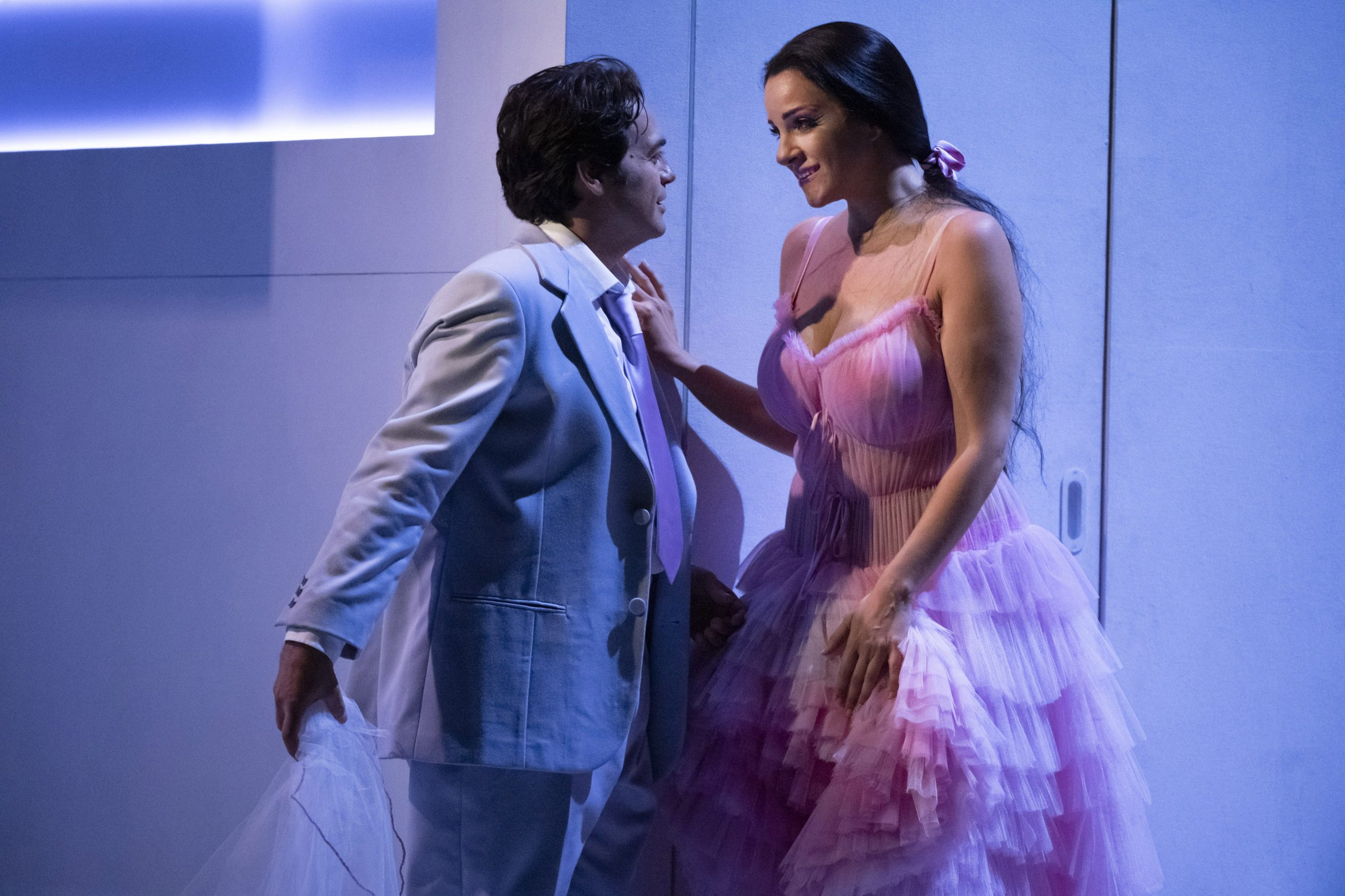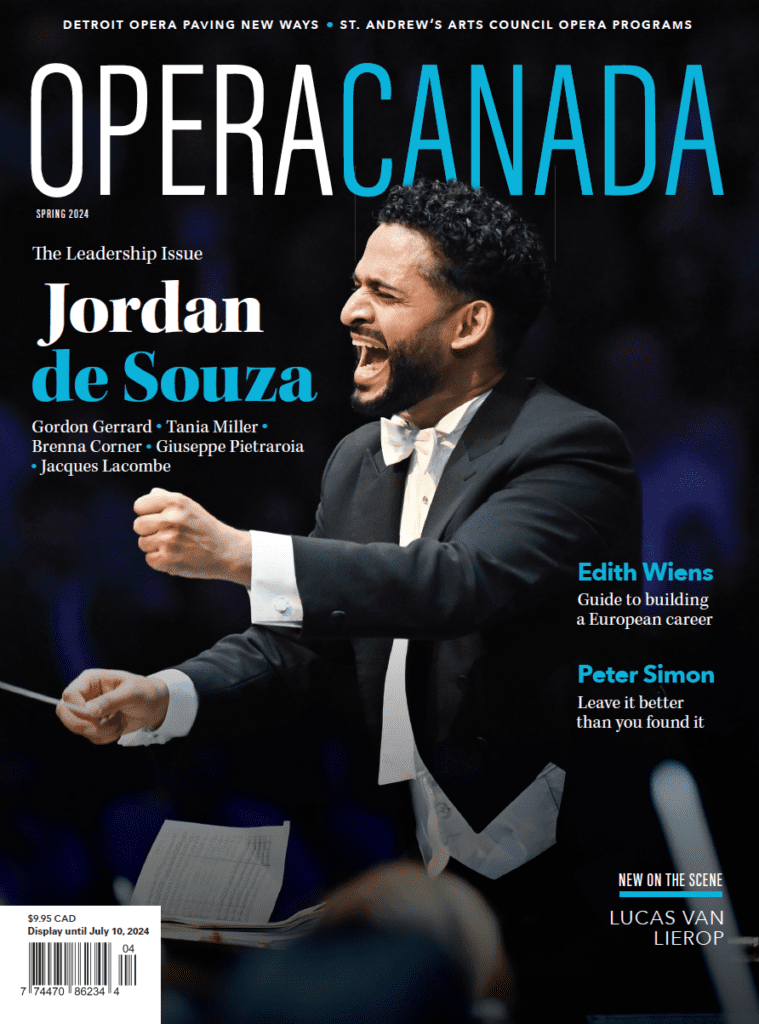Welsh National Opera’s previous production of Puccini’s Madama Butterfly, by Joachim Herz, stayed in their repertoire for 40 years. The company’s brand-new production, unveiled this season, faces not only the challenge of comparison with a much-loved predecessor, but also that of the social, racial and political debates that have come to the forefront of thought in those four decades. The operatic world has pioneered colour-blind casting over that time, but that doesn’t leave a European company in an easier position in 2021 when casting an opera in which the majority of the characters are Japanese.
Australian director Lindy Hume has sidestepped that problem by setting the opera in a broadly contemporary, unspecified country (although of course the libretto is full of specifically Japanese references). On the other hand she has added to the difficulties facing her by tilting the production towards a critique of the sex trade and male/Western exploitation of women in poorer countries. There’s no point in using a few sentences of this review to inadequately analyze the differences and parallels between today’s balances of power and US/Japanese relations in the early 20th century; or between the geishas of the original opera and the sex-trade workers depicted in Hume’s production. After all, WNO organized a whole program of lectures and web discussions to explore exactly those issues. There are some conflicts between what we are watching and what we are hearing; also I was left feeling that it would have been braver and more hard-hitting to choose, say, a Bangkok setting rather than create a vague dystopia. But the production holds together.
Designer Isabella Bywater has created a ‘lightbox’ set of glaring whiteness (appropriately harsh lighting by Elanor Higgins). A two-storey, multi-roomed central structure serves as the marital home, but early on resembles shop shelving on which the women ‘on sale’ are paraded until selected by clients. Their costumes (I presume also designed by Bywater) are a disturbing combination of childish tweeness and labial pink frills.
By Act II Butterfly is spending most of her time in the ground-floor kitchen of her house, surrounded by bags of laundry that she is taking in to make ends meet. Incidentally, the sword or dagger with which she finally commits suicide is here replaced by a pistol.
I saw the production in Birmingham on Oct. 19th. Our Butterfly was Joyce El-Khoury, with a voice that proclaimed its lustrous distinction from the first note. “Un bel dì” was delivered with creamy tone and genuine poignancy and El-Khoury had clearly worked hard to achieve an empathy with the character that she and the audience would find convincing. I was impressed that she did not overuse the ravishing half-tones that have been her trademark in other roles. The Canadian soprano possesses a naturally commanding stage presence, and because her costuming emphasized the statuesque, I didn’t ever feel that this was a naïve and vulnerable teenager. Her singing however, was magnificent.
Conversely, Italian tenor Leonardo Caimi was an ideal fit as Pinkerton, handsome in appearance, warm of tone but with ringing clarity. He perfectly portrayed the outward glamour and inward shallowness of the character. Just as complete a performance was delivered by Mark Stone as Sharpless, with an easy, conversational way with the words, and body language that eloquently expressed both the experienced diplomat and his changing attitudes to the characters he dealt with. Anna Harvey was a spirited, three-dimensional Suzuki, Keel Watson a strong and fiery Bonze, Tom Randle a graceful and urbane Goro.
I’ll dispose of one small criticism of the orchestra—somewhat approximate intonation from the double basses—before praising to the skies the contribution from the pit. Musicians and singers know how magnificent an interpreter of Italian opera is Carlo Rizzi, WNO’s conductor laureate. It’s about time the music press gave him his due. In an era when opera performances are so often entrusted to the merely competent, it was a thrill to hear a score illuminated from within by a conductor of such insight, able to communicate with such clarity—and played by such a responsive and sensitive orchestra, blessed with players of the highest quality. Every detail of phrasing was meant, telling, and exquisitely realised. As for the bigger picture, the Birmingham audience, encouragingly diverse in terms of age and ethnicity, were swept along on a surging emotional tide.
The production tours the UK (with cast rotations) until May 2022, details & tickets available here.
Opera Canada depends on the generous contributions of its supporters to bring readers outstanding, in-depth coverage of opera in Canada and beyond. Please consider subscribing or donating today.






